- Home
- Edward Lee
The Black Train Page 3
The Black Train Read online
Page 3
But Collier’s brain continued to ooze the dirtiest thoughts. He imagined closing his hands over the plump breasts, which were surely as firm as grapefruits.
Then he winced at himself and ordered his mind off the subject. He turned quickly…
A large oil painting hung on the sidewall: a stern-faced man in coattails and muttonchops. His expression looked preoccupied and unpleasant. “Who’s that?”
Mrs. Butler’s craggy face seemed to grow more craggy when he asked. “That’s the man who built the house your two feet are standin’ in right now. Mr. Harwood Gast. The most famous man to ever live in this town.”
“The town’s founder, I presume.”
Why did she seem perturbed now? “No, sir. The town was originally called Branch Landing.”
“Same as your bed-and-breakfast. But…I don’t understand.” Without conscious forethought, his eyes were back to roving the richly curved body tight in the cotton garments. Jesus…
“The town was called Branch Landing ’cos three main roads branched out from it, to three major rail cities. But when Harwood Gast arrived with all his cotton money—and his damn railroad—the townsfolk were all too happy to rename the place in his honor. This house, in fact, was called the Gast House until the day I bought it from my uncle. See, he was related to the folks who bought the place in 1867. But the minute I took over here, I changed the name of the inn.”
The words floated. Collier, ignoring the woman’s old face, was rapt again on the filled bosom, and obsessed with the idea of what they must look like nude. But as the image percolated, he finally became aware of this strange taint of his character.
What the hell is wrong with me! he yelled at himself. At once he felt ashamed. I’m lusting after an OLD LADY, for God’s sake! Get your head on straight, you pervert! Then he shoved his attentions back to her discourse.
She changed the name, he thought. Why? “I’m still a bit confused. This entire town is a Civil War attraction. Why not call your bed-and-breakfast the Gast Inn? It seems to make the most commercial sense to keep the name of the town’s most famous figure, doesn’t it?”
Sullenness fell over the old woman like a cloud’s shadow. “No, Mr. Collier, and I’ll tell ya why. Harwood Gast weren’t just the town’s most famous figure. He was also the town’s most evil figure.”
II
Another day, another hustle, the young man thought but then he said, “That’s it, bitch. You’re learnin’.”
The fat man, on his knees, moaned in anguish, his head going back and forth at the young man’s bare crotch. Tears flowed from squeezed-shut eyes—tears of joy.
The sun glowed on the younger man’s bare back; he always took his shirt off for this one. Sweat made the muscled lines gleam. He wasn’t attracted to the fat man at all, of course, which is why he filled his head with images of Hollywood’s most preeminent men: Cruise, Pitt, Crowe. It was always necessary when his “job” required him to perform in this rather opposite fashion. But no amount of fantasy could shut down the reality. The man so urgently fellating him was nothing to look at—and close to sixty—and whenever he opened his eyes, Pitt’s chiseled visage turned into the fat man’s bald head. Gotta get this over with. He grabbed the man’s fat jowls and pushed his mouth off, then began to masturbate…
“Yeah, that’s right, honey, you like that, don’t’cha? Yeah, you got some BIG fat tits on ya. Next time I just might have me a tittie-fuck as much fat as you got.”
“Oh, God, yes!” The fat man paused and sobbed.
A minute later, the deed was done, and the fat man—his face splattered—fell back into the grass, moaning.
“How’d ya like that, ya big fat bitch?”
“I-I simply adore you…”
The younger man stepped back in the sun. Poor fucked-up bastard, he thought. He’d made a mess of the fat man’s mustache and Vandyke.
“Game’s over,” the younger man said, hitching up his jeans.
“I-I adore you…”
“Aw, come on now. You know the rules. I gotta go.”
“But—please. Just—”
The gleaming washboard abdomen flexed when the younger man pulled his tight T-shirt back on. “Huh?”
Sheepish, embarrassed. “You know.”
The younger man frowned. “Oh, yeah.” He stepped forward and—
ccccccur-HOCK!
—spat in the fat man’s face.
“Oh, God! Thuh—thank you!”
I HATE turning tricks like this, the younger man thought. Now that he was done, he gazed across the sweeping field. Trace breezes shifted the miles of belthigh rye grass. He’d heard that during the Civil War, Gast’s plantation tracts took up thousands of acres: cotton, soybeans, and corn, mostly. Now it was just green wasteland, and he knew why. But he was not quite complex enough to realize how securely he was standing on a plot of significant American history.
The fat man was still on his knees, crying.
Aw, Jesus! “Why don’t’cha git up now? I need to be gettin’ back.”
Chopped sobs hacked out the words, “But you’re so important to me! I couldn’t live without you!”
Pain in the ass. The younger man only understood a little of this. Usually they pay me to do the sucking, not to GET sucked. Had he been more learned, he’d know that the sexual psychology of some folks was quite skewed. Debasement, like masochism, for instance, served a strange toggle in the mind that had been conditioned for years (since childhood, often) such that what tended to turn most people off—ugliness, abuse, exploitive behavior—lit the fuse of arousal. Oh, well. He didn’t particularly like the overweight bald man, but he similarly didn’t enjoy treating him like sexual garbage. He’d heard somebody talking once about this guy a long time ago named Hitler, who was, like, the king of Germany, and this guy couldn’t even get aroused unless a gal shat on him. The younger man guessed something similar was going on here. Weird, he thought. “Come on now, let’s git. Oh, and where’s my money?”
The quivering, plump hand held it out, a personal check for thirty dollars.
“Thanks,” the younger man said.
“Let’s go to lunch,” came more hacked sobs. “Anywhere you want.”
“Naw. Got business.”
Wet eyes implored him. “At least, at least tell me I do it better than your lover…”
A futile exhalation. “You do fine, that’s for sure,” came the overly generous charity. Actually, it was mediocre work. “But I told you, I ain’t got no lover, and I don’t never get attached in somethin’ like this. You know that. This deal’s gotta be like what we agreed. One thing in exchange for another. Right?”
Dismally, the fat man nodded.
“Here, lemme help ya up,” the younger man offered. He grabbed a fat hand. Ooof! Ya damn near weigh more than a fuckin’ washer’n dryer! Once up, the guy wouldn’t let go of his hand. Ain’t nothin’ worse than a mushy fag. He pulled away.
The fat man stared, tears still streaming. “I’d do anything for you…”
Oh, man! The younger man knew he needed to be careful. After all, this was good money for fast work. “Look, I can tell you’re out’a sorts right now, so I’m gonna take off. I’ll walk back. But just you stay here a while and calm down, git yourself together. You don’t wanna be going back to town all cryin’ like ya are. And wipe that mess off your face.”
A jowly nod, a handkerchief across the eyes, lips, and Vandyke.
“That’s better.” The younger man held up the check. “You call me when ya wanna go again.” And then he turned and walked off.
He strode right out of the clearing into a path between the high grass not even shoulder-wide. Dissolving words faded behind him:
“I love you…”
Shee-it…
He strode faster, to get away. Walking was fine. He liked the fat man’s car—a new Caddy, with some fine a/c—but when he got in these mushy moods, shit—
I’ll walk.
Another step and—
—he stumbled and fell. His knees thunked, and when he arched around to see what he’d tripped on…
His mind quieted.
A brown skull, half buried, looked back at him.
He wasn’t squeamish but then he did believe some of it. He’d seen some things, for sure—out here, and at the house…
A quick chill rippled up his sunbaked back. He knew the skull was very old. He also knew it was likely the skull of a slave, not a soldier killed in the field.
The skulls were actually all over the place.
CHAPTER TWO
I
“You’re right,” Collier said to the old woman. He marveled over one of many glass display cases. “Your inn is like a mini-museum.” Below his gaze lay an array of Civil War-era implements. Each one was labeled. MESS PAN—1861, MORTISE TWIVEL—1859, .36-CALIBER SELF-COCKING STARR REVOLVER—1863.
“Just you take a look at the Gast Museum downtown and tell me what we got here ain’t a lot finer’n more interesting,” Mrs. Butler bragged.
The next case sported gloves, belts, and footgear. “Brogen?” he asked of the clunky black shoe.
“That was the standard combat boot back then. They were as important to a fella’s survival on the battlefield as his rifle.” She leaned, pointed to a different styled shoe. The gesture caused Collier to run his gaze across the sweep of her bosom, after which he blinked hard to sideswipe the distraction.
“But this ’un here,” she continued, “was the cream’a the shoe crop. The Jefferson shoe, or bootee as it was called. Mr. Collier, you could put that shoe on right now and it’d fit better than any fancified Gucci you might buy today.”
Collier looked at the high-top leather shoe. Save for a few scuffs, it looked in excellent condition. The label read: FEDERAL PATTERN JEFFERSON BOOTEE—1851—WORN BY MR. TAYLOR CUTTON, RAIL INSPECTOR FOR THE EAST TENNESSEE AND GEORGIA RAILROAD.
“Everything here was found on this premise at one time or another,” Mrs. Butler said. Now she stood back proudly, crossing her arms under her breasts, which made them appear even larger. “I get a tax break through the state historical commission by displayin’ it all…and by keepin’ that blasted portrait of Gast hangin’ up there.”
The most evil man to ever live here? Collier was amused. It was likely just promotion. “If this man was so evil,” he baited, “I suppose the house is haunted, huh?”
“Only by the memory of that low-down bastard,” came the strange response.
Collier changed the subject, back to the Jefferson shoe and its long-dead owner. “But I’ve never heard of this railroad. Was this prewar?”
“They started in 1857 and finished in 1862,” she said. “It was Gast’s railroad. He put down track from here to the middle’a Georgia, the perfect junction from the main roads that branched into town. He built it with a hundred slaves and fifty white men—not a bad feat for back then. That’s a lotta rail to lay.”
The notion impressed Collier. They had no machines to do it back then, just hard-muscled humans lugging iron rails and driving spikes with hammers. Five years…Collier suspected that the hardest labor he ever did was carrying groceries from the car to the house.
“And this?” he asked.
ASH CAKE—1858
“Ash cake is what they used for soap back then,” Mrs. Collier went on. “Weren’t no Ivory or Irish Spring, you can be sure.”
The grayish cake was the size of a hockey puck. “How was it made?”
“They throwed a bunch of animal fat in a barrel of boiling water. Horse fat, mostly. Never pork or beef ’cos them was good for eatin’. So they boil the fat and slowly add ashes—any kind: leaves, grass, plants. Boil some more, then add more ashes, boil some more, then add more ashes, like that all day long. By the time the water’s all cooked off, the fat’s broken down and mixed with the ashes. That’s when you cut your cakes and set ’em out to dry.” Her old finger tapped the glass. “Works as good as anything they make today in fancy factories. It’s rough but gets you cleaner than a whistle. See, people didn’t wash much back then, only every Saturday before the Sabbath, and not much at all during the winter—back then a bath could give you pneumonia. Ladies would clean themselves a bit more than fellas, though, with hip baths.”
“Hip baths?”
“Just a little tub with leg cutouts. You lower your privates into it. We’ve got one here—upstairs right next to your room’s a matter of fact. I’ll show it to ya.”
Collier couldn’t wait to see the hip bath.
“So much about the old days folks just got the wrong idea about. About the South in general.”
The next objects in the case seemed bizarre: six-inch-long metal implements with coiled springs on the end. NAUGHTY GIRL CLIPS—1841. “What on earth are these? They look like clothespins.”
Mrs. Butler smiled, and reached for the cabinet.
Collier’s eyes widened as she leaned forward. He just couldn’t keep his gaze off her bosom…
“Stick your finger out, Mr. Collier,” she instructed.
“What?”
“Go on. Stick it out.”
Collier chuckled and did so.
The tines squeezed down and began to hurt at once.
“See, when little girls were naughty, their daddies put one’a these on their finger.”
Only five seconds had passed and Collier was wincing.
“How long the clip’d stay on depended on how bad the little girl was, see? Say she didn’t do her mornin’ chores, for example; then she’d likely get the clip on for fifteen seconds.” The old lady’s eyes smiled. “Hurt yet, Mr. Collier?”
“Uh, yeah,” he admitted. It felt like pliers on his finger.
“Or say she stole a piece of rock candy from the general store; then she’d probably get a minute…”
Collier’s finger was throbbing in pain, and he’d only done twenty seconds so far.
“And if she ever dared talk back to her momma or daddy—two minutes at least.”
Collier chewed his lip a few seconds more, then insisted, “Take it off!”
Mrs. Butler complied, clearly amused. Collier’s crimped finger was red above the joint. “Aw, but you barely done thirty seconds, Mr. Collier.”
He wagged his hand. “That hurt like hell…”
“I’ll bet’cha it did. That’s why little girls didn’t act up much in the good old days. A couple minutes with the clip was all the discipline they needed. Wasn’t uncommon for a little girl to wear it five minutes for usin’ profanity, or gettin’ sent home from the schoolhouse.”
“Five minutes?” Collier objected. “In this day and age, they’d call that child torture.”
“Um-hmm. But I dare say, if our teachers used these clips in the schools today, we wouldn’t be havin’ all these problems we see on the news.” She put the bizarre clip back in the case. “I’m sure you agree.”
Collier couldn’t dredge a reply. “But those clips were only used on girls?”
“That’s right.”
“What about the boys?”
A self-assured snicker. “When boys misbehaved, their daddy’d simply take ’em out to the woodshed for a thrashin’.”
“Ah. Of course.” Collier rubbed his finger. He was a bit pissed by the history lesson. That hurt like hell! he wished he could bark at her. But her next gesture deleted the incident.
She unfastened her top button, then vigorously fanned the V of her blouse—which only revealed more of the awesome bosom.
“I keep forgettin’ to turn the a/c up higher this time of day,” she said. The sun was beating in through the high front windows. “Are you hot, Mr. Collier?”
Only below the belt, he thought. The image of the flesh of her bosom and the deep cleavage stoked him. “A little, now that you mention it.”
“I’ll take care of that presently.” She kept puffing the blouse; Collier could see a mist of sweat frosting the skin within.
Something else caught h
is eye in the last case: a pale gray slip of paper that looked like an old bank check. He squinted.
RECEIVED OF: Mr. N. P. Poltrock, AGENT OF THE EAST TENNESSEE AND GEORGIA RAILROAD COMPANY, Fifty DOLLARS.
“Wow,” Collier remarked when he noted the check’s handwritten date. Sept. 16, 1862. “What an old document, and it looks in perfect shape.”
Mrs. Butler stopped puffing air through her cleavage. Her expression soured. “A paycheck from Gast’s damned railroad. But, yes, it is quite old.”
Gast again. The very mention of anything related to him corrupted her disposition.
“It’s just terribly interesting, isn’t it?”
“What’s that, Mr. Collier?”
“A piece of paper signed by someone during the Civil War.”
“We prefer to call it the War of Northern Aggression,” she insisted.
“But wasn’t it Southern aggression that actually started the war?” Collier said and immediately thought better of it. “It was the Confederacy that bombarded Fort Sumter.”
“But it was the North, Mr. Collier, who begged for it by charging high tariffs on cotton exports,” she snapped.
“I see…” Collier looked at the check again, imagining it being signed nearly a hundred and fifty years ago, when the solidity of the nation was dangling by a thread.
“Where is that silly child with your bags?” she asked, frowning at the door.
“I better go help her. They’re pretty heavy—”
“No, no, please. Believe me, it’s a thrill for the poor thing. It’ll tickle her pink to carry a celebrity’s bags.”
Collier frowned when she wasn’t looking. I was a minor celebrity at best, and now I’m a has-been celebrity. He didn’t have the fortitude to tell her his show was being canceled. Then the myth would be shattered, and all I got is the myth…
The bell at the desk rang. Collier noticed two guests—a couple in their thirties. Tourists, he discerned. A camera slung around the man’s neck. He was nondescript in a tasteless striped short-sleeve shirt and beige Dockers strained at the waist. He held a finger up to Mrs. Butler.
“Oh, the Wisconsin folks,” she muttered. “They must want a tour brochure. I’ll be right back, Mr. Collier.”

 In the Year of Our Lord 2202
In the Year of Our Lord 2202 The Minotauress
The Minotauress Terra Insanus
Terra Insanus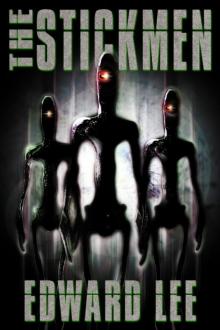 The Stickmen
The Stickmen Flesh Gothic by Edward Lee
Flesh Gothic by Edward Lee Family Tradition
Family Tradition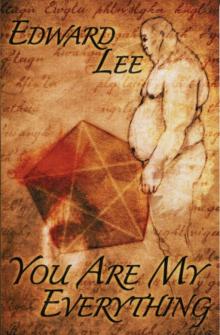 You Are My Everything
You Are My Everything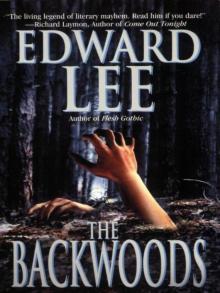 The Backwoods
The Backwoods The Teratologist
The Teratologist Smoke and Pickles
Smoke and Pickles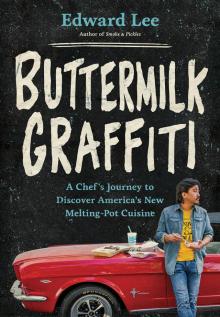 Buttermilk Graffiti
Buttermilk Graffiti Dahmer's Not Dead
Dahmer's Not Dead Quest for Sex, Truth & Reality
Quest for Sex, Truth & Reality The Innswich Horror
The Innswich Horror Brides Of The Impaler
Brides Of The Impaler Goon
Goon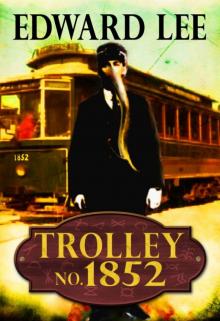 Trolley No. 1852
Trolley No. 1852 Sacrifice
Sacrifice Monster Lake
Monster Lake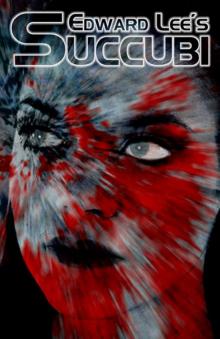 Succubi
Succubi Lucifer's Lottery
Lucifer's Lottery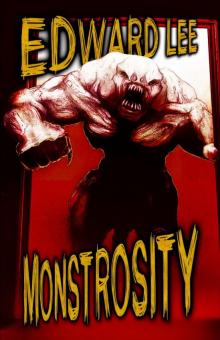 Monstrosity
Monstrosity The House
The House The Dunwich Romance
The Dunwich Romance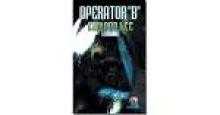 Operator B
Operator B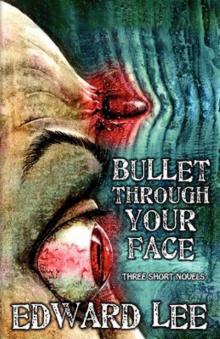 Bullet Through Your Face (improved format)
Bullet Through Your Face (improved format) Grimoire Diabolique
Grimoire Diabolique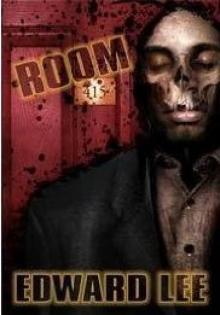 Room 415
Room 415 The Messenger (2011 reformat)
The Messenger (2011 reformat)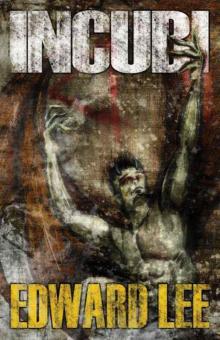 Incubi
Incubi The Black Train
The Black Train House Infernal by Edward Lee
House Infernal by Edward Lee City Infernal
City Infernal Creekers
Creekers The Haunter Of The Threshold
The Haunter Of The Threshold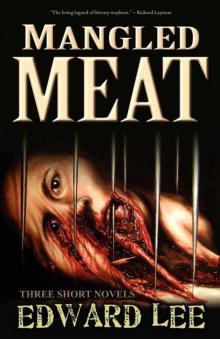 Mangled Meat
Mangled Meat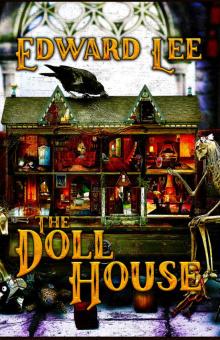 The Doll House
The Doll House Header 2
Header 2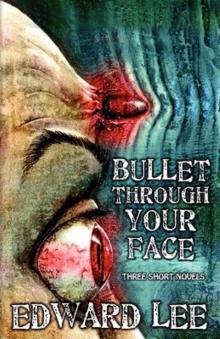 Bullet Through Your Face (reformatted)
Bullet Through Your Face (reformatted)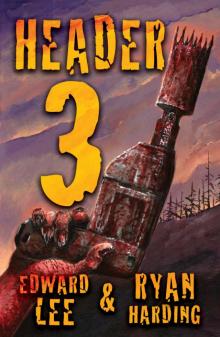 Header 3
Header 3 Infernal Angel
Infernal Angel Pages Torn From a Travel Journal
Pages Torn From a Travel Journal Edward Lee: Selected Stories
Edward Lee: Selected Stories The Bighead
The Bighead The Chosen
The Chosen